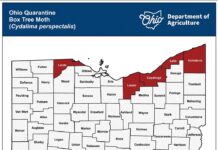WASHINGTON, D.C. — The U.S. Department of Agriculture’s Animal and Plant Health Inspection Service has issued a proposed rule to establish general regulations for improving the traceability of U.S. livestock moving interstate when animal disease events take place.
Under the rule, unless specifically exempted, livestock moved interstate would have to be officially identified and accompanied by an interstate certificate of veterinary inspection or other documentation, such as owner-shipper statements or brand certificates.
The proposed rule encourages the use of low-cost technology and specifies approved forms of official identification for each species, such as metal eartags for cattle, according to a USDA statement.
However, recognizing the importance and prevalence of other identifications in certain regions, shipping and receiving states or tribes are permitted to agree upon alternative forms of identification such as brands or tattoos.
Comments on the proposal are being accepted for the next 90 days and must be made on or before Nov. 9. The full proposal and comment instructions can be viewed in the Federal eRulemaking Portal.
Lengthy process
The new policy comes after several years of work to improve and implement better traceability of farm animals being moved from state to state. Supporters say it’s a positive step toward tracing the sources of disease outbreaks and affected animals.
“Through the past two years, I have listened carefully to stakeholders throughout the country about how to reach effective animal disease traceability in a transparent manner without additional burden,” said Agriculture Secretary Tom Vilsack, in a media statement. “We are proposing a flexible approach in which states and tribes can develop systems for tracing animals that work best for them and for producers in their jurisdiction. This approach offers great flexibility at the state and local level and addresses gaps in our disease response efforts.”
John Clifford, chief veterinary officer for the United States, said the “proposal strives to meet the diverse needs of the animal agriculture industry and our state and tribal partners, while also helping us all reach our goal of increased animal disease traceability. We believe reaching our goals on traceability will help save the industry and American taxpayer’s money in the long term.”
What they’re saying
A host of farm organizations have released statements the past few days concerning the proposal — encouraging their members to become active in the comment session, and support a rule that will strengthen their industry.
The National Cattlemen’s Beef Association chief veterinarian Elizabeth Parker commended APHIS for seeking comments and working with cattle producers.
“NCBA commends APHIS for its recent efforts to listen to concerns of America’s cattlemen in developing this traceability program,” Parker said in a statement. “NCBA encourages the agency to continue working with industry leaders on this and all animal health issues. We will carefully analyze and comment on APHIS’s proposed ADT rule. NCBA will continue to actively work with like-minded industry groups, state animal health officials and APHIS throughout the entire rulemaking process to ensure the best interests of our members.”
Doug Wolf, president of the National Pork Producers Council, said in a statement, the proposal “is a significant step in formalizing an animal traceability program” and the new rule could help open additional international trade opportunities in addition to tracing disease outbreaks.
Wolf called it “an effective traceability program would allow U.S. pork to compete more effectively in the international market place with those countries that have already implemented traceability programs.”
NPPC called the proposal “a significant step in formalizing an animal traceability program” and said “the pork industry is grateful for USDA’s effort.”
Roger Johnson, president of the National Farmers Union, said in a released statement, the rule “is a step in the right direction for animal disease traceability. We recognize that this will not prevent disease, but it does create a systematic approach to allow for swift response when there are issues. “The ability to trace, track and quarantine livestock during a disease outbreak will help minimize the economic impact it will have on the agriculture industry and rural America.”
Opposing voices
Some of the strongest opposition comes from Ranchers-Cattlemen Action Legal Fund, United Stockgrowers of America (R-CALF USA), which has raised concerns over being able to continue branding animals, and the inclusion of cattle less than 18 months of age.
“USDA is running roughshod over the U.S. livestock industry with its bureaucratic ‘we know better than the entire industry’ attitude,” said R-CALF USA CEO Bill Bullard, in a media statement. “USDA officials have deceived livestock producers by pretending to seriously consider producer recommendations and then springing these unworkable and unacceptable mandates on us in its proposed rule.”
The organization also argues that the 90-day comment period is not enough time, and falls “at a time when tens of thousands of livestock producers are battling perhaps the nation’s most widespread and devastating drought” and coincides with “the cattle industry’s busy calf-weaning and calf-shipping season.”
Still learning
Because the proposal has just recently been made, R-CALF and other organizations are still analyzing what is and isn’t included. R-CALF released a second, corrected media statement days after finding some of its initial interpretations were inaccurate.
David White, executive director of the Ohio Livestock Coalition, said the coalition will allow its livestock member organizations and producers to engage with the discussion as they see fit.
He said it’s important for producers and livestock organizations to do their own research and understand it’s a proposal, not a final rule.
“Everyone is in the process of examining this right now,” he said. “This is a proposal and they’re (U.S. Department of Agriculture) soliciting comments for this proposal.”
If making electronic comments, visit the Federal eRulemaking Portal. If making written comments, send them to Docket No. APHIS-2009-0091, Regulatory Analysis and Development, PPD, APHIS, Station 3A-03.8, 4700 River Road, Unit 118, Riverdale, MD 20737-1238.










